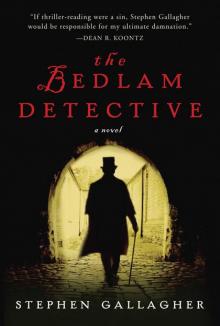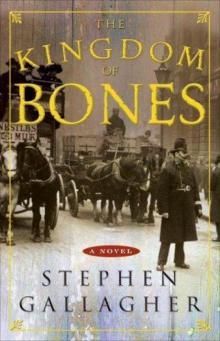- Home
- Stephen Gallagher
The Bedlam Detective Page 18
The Bedlam Detective Read online
Page 18
He said, “Over on the left-hand side are all the dated events that I can pin down exactly. On the right are those story events that clash with the calendar and can only be false. I’ve positioned all the other events somewhere in between them on a scale of credibility. Farthest to the left is your certain truth; over to the right is your certain fiction. Most things lie somewhere in between. It’s the closest you’ll ever get to a simple answer. Isn’t that what you wanted?”
Sebastian’s head swam.
“This is … very well done, Robert.”
But Robert, who was odd but no fool, could see that his father hadn’t yet grasped the point.
“It’s not just an exercise, Father,” he said.
“Of course not.”
“It’s practical,” Robert persisted, “For example. Match your firm dates to shipping records and you can track down the crew of the rescue ship that took Sir Owain to safety.”
Suddenly, Sebastian understood.
It was brilliant. With patient analysis, Robert had deconstructed the author’s method and performed a fractional separation of fact and fiction, with a precise grading of all the shades in between. It was detailed and obsessive, and-professionally speaking-a significant piece of detective work.
“That’s very impressive, Robert,” was all he could say. “Thank you.”
“And I don’t want the money,” Robert said. “It’s my contribution. To help us get by.”
Happy now, Robert went back to his room.
Alone, Sebastian paced for a while. Then he added a piece of coal to the fire, which was beginning to die. He wasn’t ready for sleep yet, and with the fire gone the room would quickly lose its heat to the night. This was one of those occasions when he could be dazed by Robert’s flights of intellect.
He thought he might tell Elisabeth. But when he went to check, she’d turned out her light. He backed off quietly, not wanting to risk disturbing her.
Back in the sitting room, he picked her rug off the chair and shook it out. Elisabeth’s recovery seemed worryingly slow. Sebastian wasn’t sure whether to blame her actual injury or the degree to which it had shaken her, but he’d seen no real improvement since the day he’d brought her home. She hardly slept. Any movement or disturbance during the night would cause her pain.
He took the poker from the grate and gave the fire one last rake-over. Then he wrapped the rug around himself and settled into a chair for the night.
The river now widened so that in places it looked like a long lake; it wound in every direction through the endless marshy plain, whose surface was broken here and there by low mountains. The splendor of the sunset I never saw surpassed. We were steaming east toward clouds of storm. The river ran, a broad highway of molten gold, into the flaming sky; the far-off mountains loomed purple across the marshes; belts of rich green, the river banks stood out on either side against the rose-hues of the rippling water; in front, as we forged steadily onward, hung the tropic night, dim and vast.
THEODORE ROOSEVELT, Through the Brazilian Wilderness JOHN MURRAY, 1914
No less than six weeks were spent in slowly and with peril and exhausting labor forcing our way down through what seemed a literally endless succession of rapids and cataracts. For forty-eight days we saw no human being. In passing these rapids we lost five of the seven canoes with which we started and had to build others. One of our best men lost his life in the rapids. Under the strain one of the men went completely bad, shirked all his work, stole his comrades’ food and when punished by the sergeant he with cold-blooded deliberation murdered the sergeant and fled into the wilderness.
THEODORE ROOSEVELT, LETTER OF 1 MAY 1914 TO GENERAL LAURO MULLER MINISTER OF FOREIGN AFFAIRS, RIO DE JANIERO
THIRTY-FIVE
The Trafalgar tavern, on the Great Bend in the Thames at Greenwich, was a large Georgian inn with dining rooms downstairs and a ballroom above. It had balconies and a terrace that overlooked the river, and to save her from waiting alone on the public embankment, the management allowed Evangeline to take a seat and watch for the ferry from there. The balconies were said to be copies of the stern galley of the HMS Victory. The river was low, and pauper children were picking for coal on the mud banks directly beneath her terrace view.
There was a train off the rails at Deptford, so she was hoping to see Sebastian Becker among the Greenwich steamer’s next batch of passengers. They had agreed a time to meet, and he was late.
A waiter came out onto the terrace. He wore a long white apron, like a Parisian serveur. He said, “Will there be any fink, madam?”
“Nothing, thank you,” she said. “I see a mist beginning to rise. Is it likely to get much worse?”
“I daresay it will,” he said. “On the other hand, it may not.”
“Does it interfere with the steamer service?”
“Sometimes it do, sometimes it doesn’t.”
“That’s very helpful,” she said. “Thank you.”
“My pleasure,” he said, and went back inside.
Evangeline’s law chambers handled some maritime business, and through records and by telegraph she’d been able to make some progress in fleshing out the real-life details of Sir Owain Lancaster’s movements at sea, as deciphered by Becker’s son from the man’s fictionalized narrative.
Though there was nothing improper about it, there was a clandestine element to her support for Becker’s inquiries. She preferred not to have it known that she was helping him, or how he’d managed to trace her. Evangeline’s arrest at the Downing Street protest had been the result of an early militancy; she’d been swept up in the Women’s Social and Political Union when a stenography student, and, at that young age, she’d been eager to compel change by the most immediate means. But now the nature of her employment put her in an awkward position, forcing her to balance conscience and necessity. Three years ago she’d given up the WSPU for the more pacifist Women’s Freedom League. She remained committed, and continued to wear the discreet badge of her allegiance. But she’d break no more windows, and would take care to avoid the risk of another arrest. It was wrong that her employers might dismiss her for political reasons, but dismiss her they would.
Looking toward the Pool of London from the Trafalgar’s terrace, she thought she could see a plume of white. She suspected that it might be from the smokestack of the London Bridge passenger steamer, but it was hard to be sure. The smoke was barely distinguishable from the general heavy mist that lay across the busy waterway today. The vessels that had passed close to the inn on their way upriver had weight and substance, their timbers groaning faintly as they glided by almost close enough to hail; ships farther off were more like pencil sketches of masts and rigging, lightly made on coarse paper.
Through the naval register, Evangeline had traced the British merchant vessel stationed off the South American coast and assigned to transport and collect the Lancaster expedition party. Its captain now had another command, and was at sea. But the master’s mate had been injured, and retired from the service; a former navy man, he taught navigation and seamanship to officer cadets at the Royal Naval College, Greenwich.
It was, indeed, the steamer. As it came about to the pier, Evangeline made her way through the inn to the river walk, and was almost at the pier gates when Sebastian Becker emerged through them.
“I know I’m late,” he said when he saw her. “Forgive me.”
Evangeline said, “I was curious to see who’d come rolling in first. You or the fog.”
Sebastian saved his explanation. He saw no reason to burden Miss Bancroft with his troubles. His wife had suffered a bad night, and he’d felt unable to leave her without first arranging for one of the Evelina nurses to call by.
From the pier it was no more than two hundred yards’ walk to the West Gate of the Royal Naval College. Built as a hospital on the site of a palace, the complex had been run down as such and its great Corinthian halls and domed buildings converted to other uses. All of the pensioners were long go
ne, and a part of the college was now dedicated to the instruction of naval officers. One hall was a museum, and many of the suites of rooms stood empty.
To enter the railed boundaries of the college was like walking into a small renaissance town, but with broader streets and English weather. A glance from the main avenue toward the building known as the Queen’s House brought an arresting, disconcerting sight: in the square before it stood a full-sized three-masted corvette, landlocked but fully rigged, under full sail with boys manning her yards. In the Queen’s House was the Royal Naval School, the so-called cradle of the navy, where boarded a thousand sons of British seamen and marines. The training vessel Fame had been assembled by shipwrights on solid ground and had nets strung, circus-style, to catch any white-suited unfortunate who might fall from the rigging in the course of his training.
They made their way to the Painted Hall, a public space within the college where anyone might linger between ten o’clock and four. The hall’s polished wooden doors led them into an immense ornately painted chamber, its walls a riot of trompe l’oeil on plaster. Fifty feet above them was a ceiling of even greater dark detail and intensity, paintings in which gods and angels and eighteenth-century heroes fought, flew, and frolicked in one seething mass. A century before, Lord Nelson had lain in state here for the three days before his funeral. Some ten thousand souls were said to have been pressing at the gates on the morning they were opened.
The floor was gray marble. If any part of the interior was not painted, it was gilded. A few visitors browsed at the far end of the enormous room. Sebastian had a cadet sent out with a message for the man they were to meet. With barely a glance at the glories around her, Evangeline said, “I had a letter from Mother.”
“Is she well?”
“She says that the day-trippers have started returning. Not in spite of the murders. Because of them.”
“It happens,” Sebastian said.
“I think it’s awful,” Evangeline said. “The tearooms have stayed open, and old Arthur and some of the others make a few shillings by guiding parties up to the spot where the bodies were found. The people openly admit the reason for their visit. Paying their respects, they call it. They didn’t even know the girls! Yet they’ve read all the newspaper stories and want to gawk at where they lay. What kind of respect is that?”
“I’ve seen it before at the scene of a tragedy,” Sebastian said. “People making a day out of it. They get all the exercise of grief, without personally having to suffer anything.”
“I don’t know who’s worse,” Evangeline said. “Them for making the journey, or those who welcome their money.”
His name was Albert Wilder, and he’d been the master’s mate on the expedition’s support vessel. Another cadet fetched them to him, in an empty classroom overlooking a cobbled yard. A man of some thirty-odd years, Wilder had been aged by suffering and yet seemed in no way infirm. He wore the instructor’s uniform of double-breasted jacket and peaked cap. He removed the cap in acknowledgment of Evangeline’s presence.
The classroom had a plain wood floor and no desks, only a single square table and a couple of benches. Crowded into the room were four huge and fully detailed ship models, the largest of them with a masthead almost touching the ceiling. These were no toys, but were for the purpose of instruction. On a raised platform stood a complete and functioning ship’s wheel.
Sebastian said, “Thank you for this interview. Did my note give a sufficient explanation?”
“It did,” Wilder said, “though I wondered if you might be better served by reading the surgeon’s log for the return voyage.”
“We’re pursuing everything, Mister Wilder,” Sebastian said. “And I’d like to hear whatever you may have to say.”
He saw Wilder glance at Evangeline. “There are some disturbing details,” Wilder said. “How plainly should I speak?”
The question was addressed to Sebastian, but Evangeline answered it.
“As plainly as the story requires,” she said. “Make no special consideration for me.”
They sat on the cadet students’ benches, and Albert Wilder told them his tale.
He said, “From the moment I saw the nature of Sir Owain’s preparations, I believed that I was looking at a disaster in the making. I’ve lived a modest life, but I’ve observed something about prominent men. They become convinced that their success in business proves the superiority of their opinion in all other things. It doesn’t matter what your skills are, or what it is that you do. They’ll not hesitate to tell you how you ought to be doing it.”
Evangeline said, “I take it you weren’t impressed by Sir Owain?”
“I found him charming, in what little contact I had with him. But when I saw the way that he’d equipped his expedition, I knew that it was doomed in one way or another.”
Sebastian said, “Others must have seen what you saw and reached the same conclusion. Did no one warn him of it?”
“There’s no advising a man who’s rich enough to take a coastal feeder out of service and have it at his disposal for most of a year. Sir Owain was determined to conquer the interior in high style.”
At this point, Wilder paused for a moment. He seemed to feel that he was getting ahead of himself. After regathering his thoughts, he began at the beginning.
He said, “Our company was based in Liverpool. Our sea routes were all along the eastern side of South America, from Venezuela down to Brazil. Our officers were mostly British and our crews a mix of all nations. Are you familiar with the landscape of South America?”
Evangeline said, “Only to recognize the shape of it on the globe.”
Wilder faltered a little. Consciously or not, he’d been addressing himself almost exclusively to the other male present.
With an attempt to include Evangeline, he said, “Our orders were to meet Sir Owain’s party in Caracas and transport them and their equipment to a set-down point on the coast. From there, they’d journey overland to the source of one of the Amazon’s tributary rivers. From the headwater they’d travel all the way down the river in boats, taking measurements as they went.”
“Measurements of what?” Sebastian said. “I’ve never fully understood the purpose of the expedition.”
“Sir Owain was developing a system for aiming big guns by the stars. He was compiling a set of tables that required observations from specific points on the globe. I didn’t understand his system then, and I don’t understand it now. And I teach navigation for a living.”
“Do go on,” Evangeline said.
Wilder said, “When we arrived at Caracas, all of his cargo was lined up on the docks and waiting for us. It took us most of a day to load. One net alone was filled with crates of fine wines and pates, and English cheeses soldered into tins. One crewman swore that he looked between the bars of a crate and saw a child’s playhouse and a rocking horse packed in straw. Someone came up the gangplank with a crystal chandelier, holding it up high like a birdcage. They had carpets for their tents and a fully equipped field kitchen with a French chef to go with it. A box the size of a small pantechnicon was said to contain a selection of outfits for Sir Owain’s wife. Sir Owain’s personal luggage included a mahogany gun case, which no doubt explained the two springer spaniels that we hoisted on board in a cage.”
“He took the family pets?” Sebastian said.
“His gun dogs. His plan was to shoot birds, and he had hopes of bagging a jaguar. The dogs were let out on their first night on land, and one of them didn’t return. The other one wouldn’t leave the camp after that, but within a week something had come in and taken it.”
Evangeline said, “With all that cargo, how large was the party?”
“Thirty Europeans in the main party, with a hundred and fifty Portuguese-speaking laborers set to join them for the land and river journey. As well as the guides and quartermasters he had an astronomer, a chief engineer, and a surveying team with an instrument maker to maintain and repair the survey equipment. He
had a mapmaker and a botanist who doubled as the expedition’s doctor. It seemed as if Sir Owain’s plan was to overcome all challenges by simply assembling the full weight of modern civilization and driving it through them.”
“All the same,” Sebastian said. “Who’d take a woman and child into such a situation?”
“I think he took a landowner’s attitude to the world. Wherever he might care to go, he would have it tamed to his purpose like one vast country garden. He and his family would picnic in the jungle, if he so chose.”
“For most men,” Evangeline observed, “planting a flag will usually suffice.”
“We sailed along the coast to the point he’d selected for the start of the land journey. His Portuguese-speaking camaradas had a camp set up and had been waiting there for a month at half pay. They set about the unloading with eagerness, happy to break the tedium and impatient to start earning their full rate. But as the riverboats were disembarked, and the gangs of men struggled to manage the weight and the bulk of them, I could see looks being exchanged.
“Over the boats, for one. They were of a badly chosen design. The Amazon is a broad, slow river that’s easy to navigate. Its tributaries are anything but. They twist and drop through falls and rapids, and the only way to make progress is to leave the water and carry your boats and cargo down to the next calm stretch. These boats were made of steel, and very heavy. It took six men or more just to lift one.
“But there were other, more immediate problems. They faced two months of overland travel before they’d even reach the river; they had a hundred mules and fifty oxen and, most spectacular to our eyes, five huge steam cars each carrying two tons of freight.”
He shook his head, as if the memory of those great mobile machines impressed him still.
He said, “They ran on wheel-driven tracks that made short work of mud or dense foliage. But of the seven steam cars that had set out, two of them had already failed on the way.

 The Boat House
The Boat House The Bedlam Detective
The Bedlam Detective Valley of lights
Valley of lights The Kingdom of Bones
The Kingdom of Bones